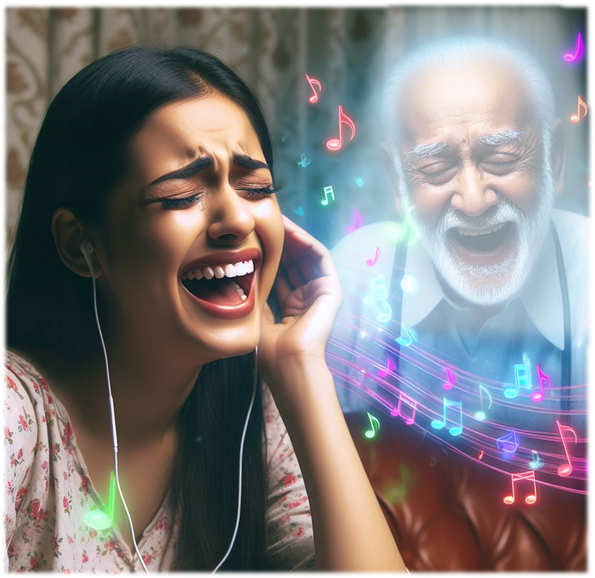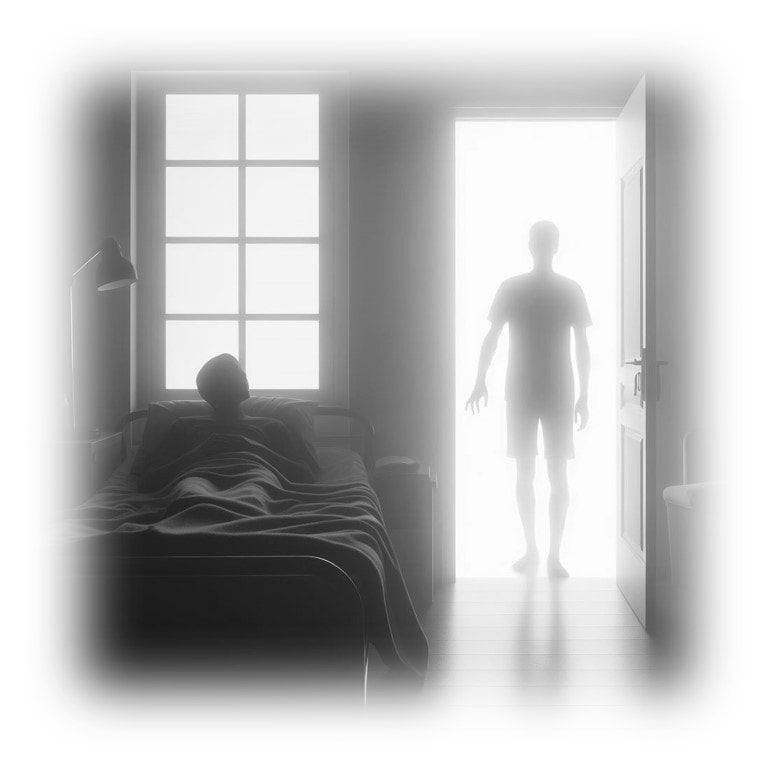|
She had recently lost her job. Her family business was sinking. Her father had just been rescued and brought back home safely after yet another unannounced trip outside home, lost in the shadows of dementia. Her mother was struggling to take care of her own health even as she tried her best to look after her husband. And one of the many caretakers who joined and left, had walked away with all the savings of the family.
Then life became a song, several songs, for all of them, at least for a few days. It was not an easy decision, but the daughter decided to take on the additional responsibility of moving her parents to her own place. Steeped as the family was in music, it was but natural for all of them to gather around his bed and sing song after song and play antakshari. The change in the father was very visible. He smiled. Life returned to his eyes. His fingers remained rigidly curved but he would make an attempt to clap whenever he won the singing game. And he did win multiple times because he knew which songs to sing. The musical notes drove away their loneliness. No longer were they two bodies in another corner of the town that others were obliged to look after. There was no changing tomorrow. Today they sang. Then one night the father indicated that he wanted to go home to that lonely house where he lived with his wife. He was insistent. The daughter obliged. A late-night ambulance took them there. All the paraphernalia that had moved with them went back. Tired, the daughter decided to take it easy for a couple of days. Until her mother called. He had stopped trying to talk. Eyes closed. Not moving at all. The daughter rushed. Holding his hand, she called out to him. With great effort, he tried to open his eyes. Apparently, he recognised her. Just one word escaped his mouth: “sing.” And she sang. His favourite song. His face transformed. He was almost smiling. The next day he passed away in peace, at home. Life has pulled her back to its many inevitable chores and testing challenges. But she is unable to fill that gap. She knows somewhere he is listening. And applauding whenever she sings. So, she sings on.
23 Comments
We celebrate sunrise, enjoy sunset. We tend to celebrate birth … but death? Inevitable as it is, we would rather not talk about it. It’s morbid, other-worldly, mysterious. Can it be illuminating? This is how Dr Christopher Kerr concluded his TEDx talk on December 2, 2015: “What if, at the end of your life, at some appointed hour, the lost return, distant feelings become familiar, and meaning is restored? If any of that is true, then dying is illuminating.” Going by what he had experienced, he said the dying often described their end of life “in ways that are actually life-affirming, and rich with meaning, love, and even grace.” And he asserted that he was not into the paranormal stuff and had “a deep aversion to the non-physical, spiritual aspects of dying.” Dr Kerr is the Chief Executive Officer & Chief Medical Officer of Hospice & Palliative Care Buffalo. So, is it possible that those working in palliative care would have experienced deathbed visions? Dr Dam's researchThe Founder and Medical Director of Kosish the Hospice, Dr Abhijit Dam has conducted a unique study on “Significance of End‑of‑life Dreams and Visions Experienced by the Terminally Ill in Rural and Urban India”. The study stated that end-of-life dreams and visions (ELDVs) were not uncommon and could occur months, weeks, days, or hours before death. The research team spoke to 60 terminally ill patients under palliative care. Most were able to recall the ELDVs vividly. Nearly 80% of the patients reported “seeing” deceased people including relatives, friends, and acquaintances. Significantly, nearly 95% patients “felt much better having discussed their ELDVs with the team”. According to Dr Dam, the “subjects found them to be distressing initially, but felt better after discussing it with our team. There was a direct correlation between severity of symptoms and occurrence and frequency of ELDVs. Another finding exclusive to our study was that the persons visualized in ELDVs did not threaten or scare the patient and the known persons visualized were seen as they were in their prime of health.” He feels that ELDVs have an important role in holistic care. “I feel that they strongly suggest the presence of life after death and when properly explained, can reinforce a sense of hope.” Karunashraya experiencesPsycho-oncologists Michelle Normen and Keshav Sharma of Karunashraya and their team shared a few experiences. “The 15-year-old boy had never seen his grandfather because the latter had expired even before his parents had got married. Yet here he was, telling his family that grandfather was standing near the door and calling him. And the young man would keep a countdown going: ‘I have three days … two days … one day ….’ He did depart on the day he had predicted, but not before specifying that he wanted to be buried, not cremated.” “This man would keep asking everyone to make space. The elephants are coming, he would say. We finally figured out that before moving to Bengaluru, he had spent his entire childhood in Odisha in a village that had plenty of elephants as neighbours.” Some envisioned peace in the world they were leaving behind before they moved on. “There was this 14-year-old boy who did not have too many days left. His father and mother were constantly arguing. It was the father’s decision to have just one child. And the mother would never stop blaming him for that decision as they faced the inevitable loss of their only child. The situation was so bad that the parents could barely be together before the child as he lay helpless. Then the boy requested a counsellor to talk to his parents, to make them happy. Finally, reconciliation happened. The three of them spoke without getting into any argument; they even had a meal together. The patient told a team member that he was now happy and ready to go. And he did leave soon after, in peace.” Dr Malushte delves into lives pastDr Rahul Malushte is a Homoeopath and has been practicing for 25 years. He integrates homoeopathy with spirituality and offers healing therapies including past life regression therapy. He communicates with “the souls of humans and animals”.
He believes that those who are about to move on are guided by “higher beings” to attain closure and peace. “It is important to listen to them when they want to talk about what they see,” says Dr Malushte. “It would be terrible to sedate them into silence because others can’t accept or are distressed by what they say. Do not contradict, do not give any false assurance. Doing either would interfere with their closure.” We carry beliefs, desires, and regrets right through our life and even “across lives”. The final moments, Dr Malushte says, provide an opportunity to let go of these. However, letting go is never easy. He once had a patient, 70 years of age, walk into his clinic. She was asked to submit details of her family and health issues as is the practice. Dr Malushte’s team was surprised to find that her list of family members included a child she had lost at birth many decades ago. She explained: “I was never able to talk about it. It is a very distressing topic for me. Every year, near the birthday of that child who was born but never lived, I would go into grief for months. Now, I am able to get out of it in 15 days.” According to Dr Malushte, such deep attachment surfaces at the time of death. “That’s when you connect with the soul again.” He believes that when you die is a choice that the soul makes, regardless of what the vital signs might say. “There was this old couple and the husband, 90 plus, was very seriously ill. He was in a coma for days, beyond medical logic. We found that was he was worried about his single daughter, their only child. As the wife also very old, he was worried who would take care of the daughter. The daughter finally managed to convey to him that she was fine and would take care of herself and her mother. After this communication, he passed away peacefully within 12 hours.” Are deathbed visions or dreams mere hallucination? Of course, it would be difficult to provide hardcore scientific evidence. As long as it brings peace to both the living and the dying, is it best to let science be and simply accept that there is more to us than we know? |
AuthorVijayakumar Kotteri Categories
All
Archives
July 2024
|



 RSS Feed
RSS Feed

